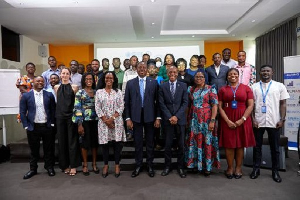The Commission on Human Rights and Administrative Justice (CHRAJ), in collaboration with the Office of the United Nations High Commissioner for Human Rights (OHCHR), UN Women, and the United Nations Population Fund (UNFPA), has organized a two-day training session aimed at equipping Ghanaian journalists with essential skills to enhance their reporting on human rights issues.
The training program, which commenced on Thursday, August 15, 2024, and concluded on Friday, August 16, 2024, brought together selected journalists to deepen their understanding of human rights and gender issues.
The training aimed to ensure that journalists have a better grasp of human rights, enabling them to effectively engage with human rights mechanisms, including protection measures.
Journalists were also educated on the importance of incorporating human rights norms into their work, aligning with the Sustainable Development Goals (SDGs), and reporting in a manner that promotes the protection of vulnerable groups.
Dr. Joseph Whittal, Commissioner of CHRAJ, emphasized the critical role of the media in shaping public perception, citing examples where biased reporting has fueled negative sentiments against marginalized groups, such as migrants and sexual minorities.
He noted that responsible journalism is essential in fostering respect for the rights of all individuals, irrespective of their background.
“We brought you here because your understanding of human rights and how to report on them is crucial,” Dr. Whittal said.
He explained the importance of distinguishing between human interest stories and those that focus on human rights, stressing that the latter centers on fundamental freedoms and entitlements that belong to everyone, without exception.
Robert Kotchani, Country Representative of OHCHR, underscored the training’s role in strengthening journalists’ capacity to report on sensitive human rights issues such as gender-based violence and electoral processes, while also implementing digital security measures to protect sensitive information.
The training, he noted, would further help journalists contribute to the realization of the SDGs and promote accountability in governance.
Anthony Abu, a UN Women communication officer, educated journalists on the need to understand gender and socio-cultural barriers to women’s empowerment.
He also encouraged media practitioners to commit to promoting gender equality and fostering violence-free elections.
Mercy Larbi, a Deputy Commissioner of CHRAJ, reiterated the Commission's ongoing commitment to monitoring elections, noting that their focus is not only on observing the right to vote but also on ensuring that accurate information is disseminated to the public to enable informed decision-making.
She stressed the importance of transparency and the public's right to information in democratic processes.
“The Commission monitors elections every year; we observe the right to vote, and this year, we will do the same. We have also been monitoring the campaign because we have the right to information. People need access to accurate information to make informed decisions, so ensuring that this information reaches the public is very important,” she said.
Fatimatu Abubakar, the Minister of Information, through a speech delivered on her behalf, lauded CHRAJ and OHCHR for the initiative.
She noted that the government’s efforts to enact the Right to Information (RTI) Act, 2019, and the Whistleblower Act were pivotal in promoting a transparent and accountable press.
AM/MA
Health News of Sunday, 18 August 2024
Source: www.ghanaweb.com













